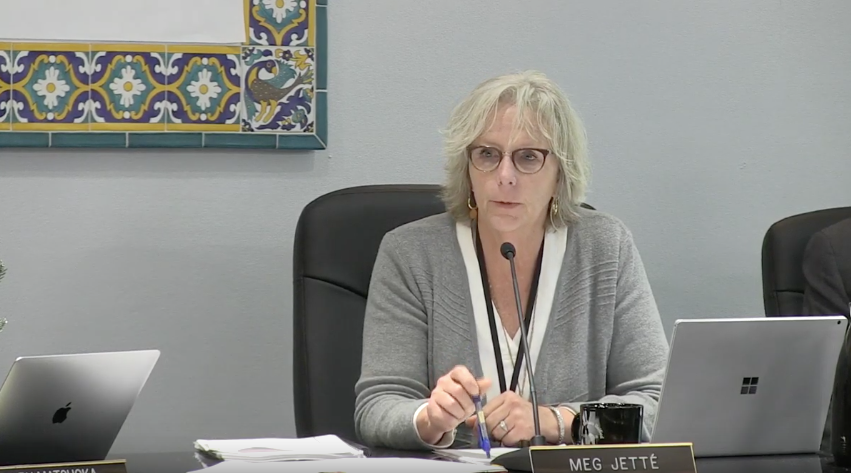Free Meal Program Safe From Chopping Block — For Now
Stakeholders Plead with Santa Barbara Unified School Board to Spare Food Service Budget

Chef Nancy Weiss has been on a mission to revolutionize the way public schools feed students since she was hired as the food service director at the Santa Barbara Unified School District more than a decade ago.
Weiss did exactly that, but now she’s stepping down for health reasons. Her retirement comes at a time when the district is grappling with slashing the food service department budget, which has raised concerns that some kids will have to go without food in the wake of the proposed cuts.
“Nancy Weiss has done some incredible things for our district with the cooking from scratch and healthy foods for our children,” said Meg Jetté, the assistant superintendent of the district’s business services.
“But Nancy’s heart was bigger than her budget,” Jetté continued. “We ended up last year contributing $606,000 to the food service department, and on top of that we did not take an indirect cost. So, it’s probably about $1.1 million loss to the general fund, which serves all of our kids.”

Jetté said that for the current 2019-2020 school year, the projected food services deficit is approximately $779,000; she itemized three problems contributing to the deficit and three “fixes” in a three-and-a-half-page report. After stakeholders pleaded with the board to reconsider, though, no action was taken.
“I was one of those kids back in the ’80s who had that card that got me a free breakfast and lunch at school,” said Michael Baker, the CEO of the Santa Barbara Boys & Girls Club. “I don’t mean to be flippant about this, but I really hope this isn’t just a spreadsheet decision. These are real people we’re talking about.”
The district’s food services department is partnered with the Boys & Girls Club in addition to other programs outside the district to help feed those in need. Weiss and Baker partnered up after he said students relying on free meals from school were still going hungry on the weekends during previous superintendent David Cash’s reign.
Weiss sent a food truck to the Westside club every weeknight, providing free dinner to every person age 18 or younger through federal funding and arranged for food services to provide brown bag lunches for the kids on weekends. The supper program has since expanded to a dozen locations.
The first proposed fix to the food service budget would cut the free breakfast programs at the six schools that don’t qualify, meaning that less than 51 percent of the students at that school must meet the federal low‐income guidelines.
Jetté emphasized that the children who qualify for the free or reduced lunches will still be able to do so, but the six schools that do not qualify for free breakfasts would stop serving them. The schools that don’t qualify are Washington, Goleta Valley, La Colina, Dos Pueblos, San Marcos, and Santa Barbara High.
“We cannot sustain spending almost $103,000 a month feeding children who do not qualify for the free breakfasts,” Jetté said. “And this is only for breakfast. We don’t feed those who don’t qualify for free for lunch.”
Her next proposal was to increase the cost per meal for the more than a dozen food programs run outside of the district, including at Boys & Girls Club. She said that because the meals were not priced accurately, the labor and food cost are higher than the amount of revenue collected. She proposed sending a letter notifying the programs the following day, December 17, and if they didn’t agree, the letter would serve as a 30-day termination notice.
“I appreciate everything you’ve done in such a short time here, but I think we all need more time to look at this,” Boardmember Wendy Sims-Moten said. “I hear you saying we are going to send out a letter tomorrow, but I think that’s ahead of what we discussed here.”
The entire board agreed with Sims-Moten. The final proposal in Jetté’s report also included cutting the district’s mobile cafés from eight to four, because they aren’t being used to their full potential and are only in operation half of the day. The supper program with the Boys & Girls Club is one of the users for the mobile cafés.
“This is a huge deficit but only a few pages of a plan,” said Boardmember Kate Ford. “I would like to work with our partners more on this so they feel they are part of the decision and not like something is being done to them.
“I feel really badly because I feel like we [the board] share a part of the responsibility, so therefore we should figure it out,” Ford said.
No action was taken, and the item will come back to the board in January 2020.




You must be logged in to post a comment.